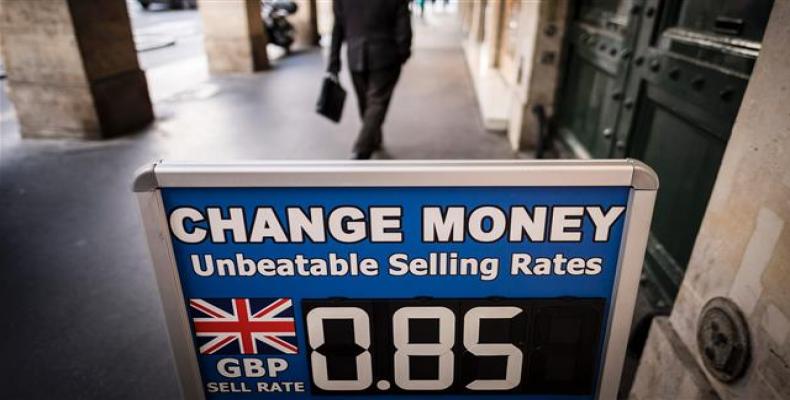London, October 26 (RHC)-- The British economy is losing momentum following a post-EU referendum bounce, as the weak pound and higher inflation signal a fall in living standards, according to new analysis.
The latest Guardian analysis of the post-Brexit economy shows a sharp fall in the value of the British currency against the U.S. dollar. The pound is hovering around $1.22, about 18 percent lower than on June 23, the day of the referendum. “The underlying pressure on the currency has remained following [UK Prime Minister] Theresa May’s declaration that she will trigger article 50 before the end of March 2017,” the report said.
Inflation also jumped more sharply than expected to one percent, the highest level in almost two years, while the UK trade deficit with the rest of the world widened, according to the analysis.
“Four months on from the Brexit vote, there are warning signs that consumers should prepare for a renewed squeeze in living standards, as the weak pound drives inflation higher and cautious businesses rein in wage growth,” the report noted.
Britain is heading for a “Brexit tsunami,” said David Blanchflower, a former member of the Bank of England’s Monetary Policy Committee (MPC). Blanchflower, who is also a professor of economics at Dartmouth College in the US, says Britain is already being hit by higher prices, slowing wage growth and rising unemployment.
Andrew Goodwin, a senior British economist at the forecast group Oxford Economics, also pointed to growing upward pressure on prices. “Both the retail sales and inflation releases suggested that price pressures are on the turn,” he said. “We expect consumer price inflation to accelerate sharply from this point onwards, averaging 2.7% in 2017. This will severely squeeze household spending power and cause spending growth to slow sharply.”
There is growing concern that firms will put hiring decisions on hold and limit wage growth as they seek to rein in costs in an uncertain business environment.
Economic growth in the UK is expected to slow significantly next year, as the consequences of the Brexit vote.
If the UK loses its access to the EU’s single market, the resulting increase in the costs of doing business and exporting to the EU would hurt Britain’s competitive position in Europe.
May held her first summit Monday with the leaders of Scotland, Wales and Northern Ireland since the June 23 referendum. Scotland and Northern Ireland voted against Brexit, and politicians from both nations have expressed concerns about leaving the bloc.
May, who is seeking to preserve its close economic ties with the EU after leaving it, is now facing challenges at home pacifying the leaders of the three devolved governments.
Falling British Pound and Rising Prices Fuel Fears of Slowdown

Articles en relation
Commentaires
Laissez un commentaire
Tous les champs sont requis
En reproduction maintenant
Sonido Cubano
Au suivant
- El Caribe que nos une
- Desde Mi Habana
- Cartas a la Redacción
Plus de visites
- Des villes cubaines et chinoises signent une lettre d'intention pour renforcer les relations bilatérales
- Equateur : Luisa Gonzalez réitère sa dénonciation de fraude électorale
- Equateur : Luisa Gonzalez met en garde contre la persécution après l'allégation de fraude
- Cuba Santé 2025, un espace pour la coopération et les échanges scientifiques
- Le Venezuela rejette un communiqué de l'Équateur "grossier et mal construit"

